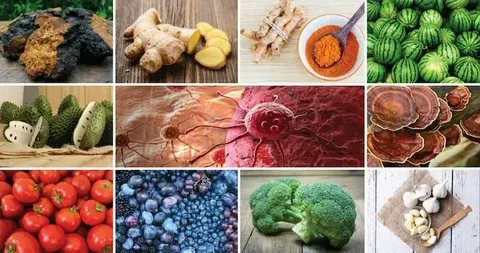Top Cancer-Protective Foods for a Healthier Life

In today’s world, cancer prevention is a significant health goal, and diet plays a critical role in reducing cancer risks. This article covers the best cancer-protective foods, detailing how they work in the body, and why you should include them in your daily meals for optimal health.
1. Introduction to Cancer-Preventive Diets
Cancer-preventive diets are rich in antioxidants, fiber, and essential nutrients that work together to strengthen the immune system and protect cellular health. These diets not only help reduce cancer risks but also contribute to overall well-being.
2. The Power of Antioxidants
Antioxidants are compounds that combat oxidative stress, a major contributor to cancer. Foods rich in antioxidants, such as berries, green tea, and leafy greens, help to reduce cell damage and lower cancer risk.
3. Leafy Green Vegetables: A Nutrient Powerhouse
Leafy greens like spinach, kale, and broccoli contain folate and fiber, which are linked to a reduced risk of colon cancer. These greens are also high in vitamins C, E, and beta-carotene, all vital in fighting cancer-causing free radicals.
4. Cruciferous Vegetables and Cancer Prevention
Cruciferous vegetables, including broccoli, cauliflower, and Brussels sprouts, contain glucosinolates, which have been shown to slow the growth of cancer cells. Adding these vegetables to your meals is a proactive way to lower cancer risks.
.webp)
5. Berries: Small in Size, Big in Benefits
Berries, particularly blueberries, strawberries, and blackberries, are high in antioxidants and fiber. Their powerful compounds, such as ellagic acid, help in reducing inflammation and preventing various cancers, including breast and colon cancer.
6. The Role of Whole Grains
Whole grains like brown rice, oats, and quinoa are packed with fiber, which helps in maintaining a healthy digestive system. Fiber aids in moving carcinogenic compounds through the digestive tract, reducing risks of colon cancer.
7. Turmeric: The Golden Spice with Cancer-Fighting Properties
Curcumin, the active ingredient in turmeric, has shown potential in preventing cancer cell growth. Adding turmeric to dishes or consuming it as a supplement can contribute to a healthier diet.
8. Tomatoes and Lycopene’s Protective Role
Tomatoes are rich in lycopene, an antioxidant that has been linked to a lower risk of prostate and lung cancers. Cooked tomatoes are especially beneficial as they release more lycopene, making it easier for the body to absorb.
9. Nuts and Seeds: A Simple Way to Boost Health
Nuts and seeds, such as almonds, walnuts, and flaxseeds, contain omega-3 fatty acids and antioxidants. Studies suggest they help lower risks of colon and prostate cancers while promoting heart health.
10. Fatty Fish for Omega-3s
Fish like salmon, mackerel, and sardines provide omega-3 fatty acids, which are linked to lower inflammation and cancer risk. Adding fish to your diet twice a week can support both brain and body health.
11. Garlic and Onions: Allium Family for Cancer Defense
Garlic and onions contain sulfur compounds that help stimulate immune defenses against cancer cells. Regular consumption of these allium vegetables can be an excellent preventative measure for several cancer types.
12. Green Tea and its Polyphenols
Green tea is loaded with polyphenols, antioxidants that play a key role in preventing cellular damage and reducing cancer risks, particularly in the breast and prostate.
13. Legumes for Fiber and Folate
Beans, lentils, and chickpeas are high in fiber and folate, which are essential in reducing colon cancer risk. Their high fiber content aids in removing carcinogens from the body, supporting a healthy gut.
14. The Benefits of Citrus Fruits
Citrus fruits like oranges, lemons, and grapefruits contain vitamin C and other antioxidants that help neutralize free radicals, potentially lowering cancer risks, especially for esophageal and stomach cancers.
15. Conclusion
.webp)
Incorporating cancer-protective foods into your diet can significantly reduce cancer risks while promoting overall health. By choosing nutrient-dense options rich in antioxidants, fiber, and essential nutrients, you take proactive steps toward a healthier future. Start today by adding these cancer-fighting foods to your diet for a natural boost in protection and wellness.
.jpg)


Comments
Post a Comment